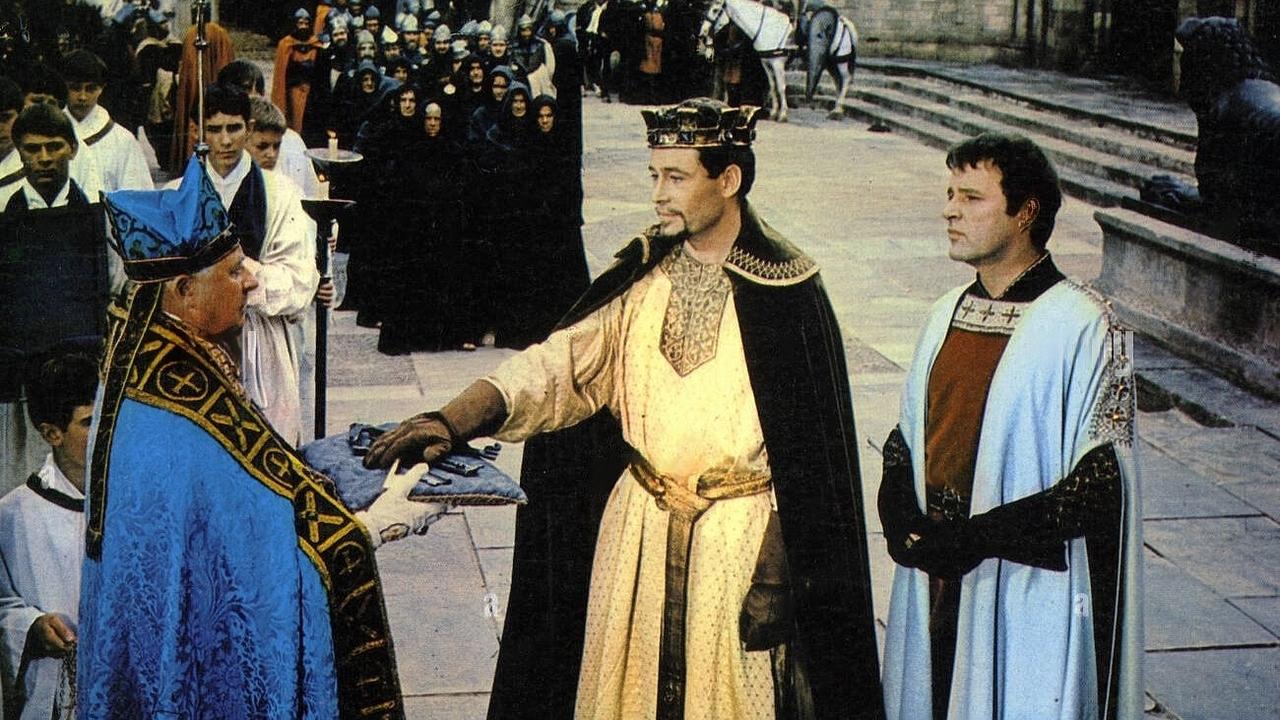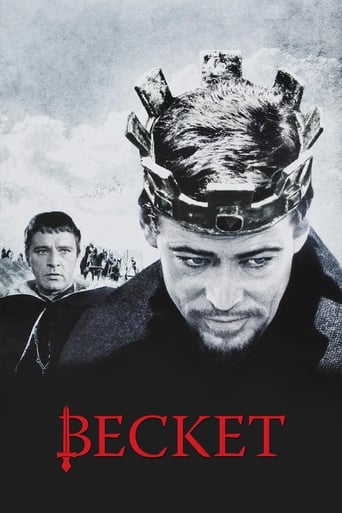

Lack of good storyline.
... View MoreGreat visuals, story delivers no surprises
... View MoreBrilliant and touching
... View MoreIt's funny watching the elements come together in this complicated scam. On one hand, the set-up isn't quite as complex as it seems, but there's an easy sense of fun in every exchange.
... View MoreBecket is a man's movie. I don't think there are any women in the cast, or if there are, they have very insignificant parts. My brother, who has been known to tolerate rather than enjoy old movies, loved this movie. Whenever he talks about the classic film genre, he says, "You know what movie I liked? Becket!" The only bad part of the movie is what happened during the 1965 awards season. Richard Burton and Peter O'Toole were repeatedly pitted against each other in the Best Actor category. If only tied awards were more prevalent. Both men were nominated for the 1965 Oscar, and Rex Harrison ran away with the gold for his bored, flippant, tired, lousy performance in My Fair Lady. If that doesn't make you lose faith in the Academy, just wait two more years for Richard Burton to once again lose the gold in Who's Afraid of Virginia Woolf? to Paul Scofield in A Man for All Seasons. Just terrible.Anyway, back to Becket. If you like Richard Burton or Peter O'Toole, you need to watch it. Their performances are fantastic beyond description; you could watch it ten times and still come out with a tie as to who gave a better performance. Pete plays King Henry II, and Dick plays Becket. The king and the archbishop differ in their core beliefs, but will religion get in the way of their friendship? Will Becket compromise his morals to stay a loyal friend to the king? The historical friendship between the two real life figures is written out thoughtfully and rivetingly, even though the story was originally based off a play. Yes, it's wordy, but none of the speeches are wasteful or boring. It's incredibly thought-provoking, constantly pulling the audience both ways. Both characters are likable and both sides of the debate are understandable. And since the actors were famous friends offscreen, it's that much more enjoyable to watch them verbally spar with each other on screen. It's a true masterpiece.
... View MoreWe have the clash of the secular world with the world of intractable religion represented here. Henry II, played by Peter O'Toole, clashes with his friend, Thomas a Beckett, played by Richard Burton. The issue is Henry's need to have dominance over the church. He feels he can parlay his friendship with Beckett into favors from the big church. Instead, he finds himself threatened with excommunication. Beckett, the ultimate moral man choose God over his friend, and like the true martyr, puts his life on the line for his faith. The scene where the two men meet on horseback on the beach is one of those we remember forever. We already know the story, so there are no surprises. All that is left is to question the decision that Henry makes. This is a classic and deserves a lot more attention.
... View MoreA very solid, engaging historical costume drama about Henry II (Peter O'Toole) and his friendship with Thomas Becket (Richard Burton), a man who Henry assumed would be his tool but who instead imposed his own principles against the king's wishes and died for it.It seems that since its release in 1964, this film has been raked over the coals for its historical inaccuracy. To which I say, anyone turning to a Hollywood version of history for facts deserves what he gets. Instead, it takes the historical premise and makes a juicy character study of it. Burton and O'Toole are in top form, and watching them butt stubborn head against stubborn head for two hours is entertaining enough to make up for any bad grade assigned to the film for its factual flaws. O'Toole especially is tremendous, giving an endlessly fascinating performance as a king who's perfectly capable of deeply loving a friend even as he calls for that friend's destruction."Becket" is the sort of respectable prestige film made to win Academy Awards, and though it won only one in 1964, for Best Adapted Screenplay (Edward Anhalt), it was nominated for 11 others, tying the nomination tally of that year's best picture winner, "My Fair Lady." Its nominations included Best Picture (Hal B. Wallis), Best Director (Peter Glenville), Best Actor (Richard Burton), Best Actor (Peter O'Toole), Best Supporting Actor (John Gielgud, for what feels like about two minutes of screen time), Best Art Direction, Best Cinematography, Best Costume Design, Best Film Editing, Best Original Score and Best Sound.Of course, 1964 is the year of "Dr. Strangelove," which blows both "Becket" and "My Fair Lady" out of the water, and which predictably won 0 Academy Awards.Grade: A
... View MoreThe royals have long been popular on the silver screen, and Becket is a pillar of the genre, despite numerous inaccuracies and a general spicing- up-of-facts going' on.Book-ended by scenes at the tomb of Thomas Becket, the rest of the film is a flashback to his life, from a wild youth, to a career as a statesman, and then his appointment as Archbishop of Canterbury.Central to the drama is the bond between Becket and Henry II, to the point that the film is almost less a biopic than the story of a relationship. Peter O'Toole is at his best here, throwing himself into the dissolute, petulant king with gusto (a role he would reprise in 1968's The Lion in Winter). He nearly steals the show from Richard Burton's gentle, erudite Becket, but if O'Toole provides driving force of the narrative, it is Burton that channels it.Both characters begin the story as thorough profligates (brief, graphic female nudity earns it a PG-13 rating), living the high life, drunk on power and luxury. Henry is a man without restraint, but one senses that the cunning, enigmatic Becket is not entirely committing himself to the revelry. Always, there is something held back, something undisclosed, something he refuses to give. It will prove his destruction, for Henry can't stand the idea that his beloved Becket may hold loyalties above and besides the king. Ironically, it is Henry himself that destroys this loyalty when he appoints Becket archbishop, for it brings the two into inevitable conflict, and forces Becket to finally commit to something, to finally "find his honor..."Secondary to this dual clash of personality and faith is the symbolic rivalry of church and state. Unlike A Man for All Seasons, a film of ideas, and people who debated and defined themselves by those ideas, this is first and foremost an emotional drama. Because of this, it's not as good a film as Seasons (which invites comparison given the uncanny similarity of events). It suffers from over-complexity, over-length, and a main character who hasn't the power to command the narrative (Burton is good, but he's no Paul Scofield, as he was quick to admit.) The music is dated, a brassy, distracting clamor that leaps in to emphasize dramatic moments but instead converts them to comedic melodrama. Occasionally we're aware we're in a play, particularly when Burton performs his prayers as soliloquies.But these are quibbles. Becket is a lavish affair, taking a far broader approach than Seasons. We get to see much more of this fascinating archaic world (the 12th rather than the 16th century), explore some truly spectacular locations, meet folk from all classes, witness the awe- inspiring ritual of the medieval church, and the ugliness of secular and religious politics. Our tour guides are two of the finest actors of their generation, who have such enormous rapport that every scene without them feels empty (even if that scene features a young, mischievous John Gielgud.)While flawed, Becket's charms are many, from the witty writing to the breath-taking cinematography. These and other things allow Becket to easily take its place among the high circles of costume drama, but it is the immense chemistry between the two leads, Burton and O'Toole, that catapults it to a place of royalty.Originally posted at http://www.longview95.blogspot.com/2014/09/becket- movie-review.html
... View More